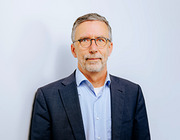Can foreign direct investments from aging industrialized countries contribute to sustainable economic growth and more material prosperity in “young”, less developed economies? What framework conditions would be necessary for this?
Andreas Esche, Director of the Megatrends Program, discussed these topics at the Global Solutions Summit 2019 with
- Allen Asiimwe (Executive Director AViD Development LtD)
- Gabriel Felbermayr (President of the Kiel Institute for the Global Economy)
- Stefan Mair (Member of the Executive Board of the Federal Association of German Industry, BDI)
- Mehmet Şimşek (former Turkish Finance Minister).
![[Translate to English:] Eine diskutierende Gruppe.](/fileadmin/files/_processed_/c/0/csm_20048728634_be_195c62d8ed.jpg)




